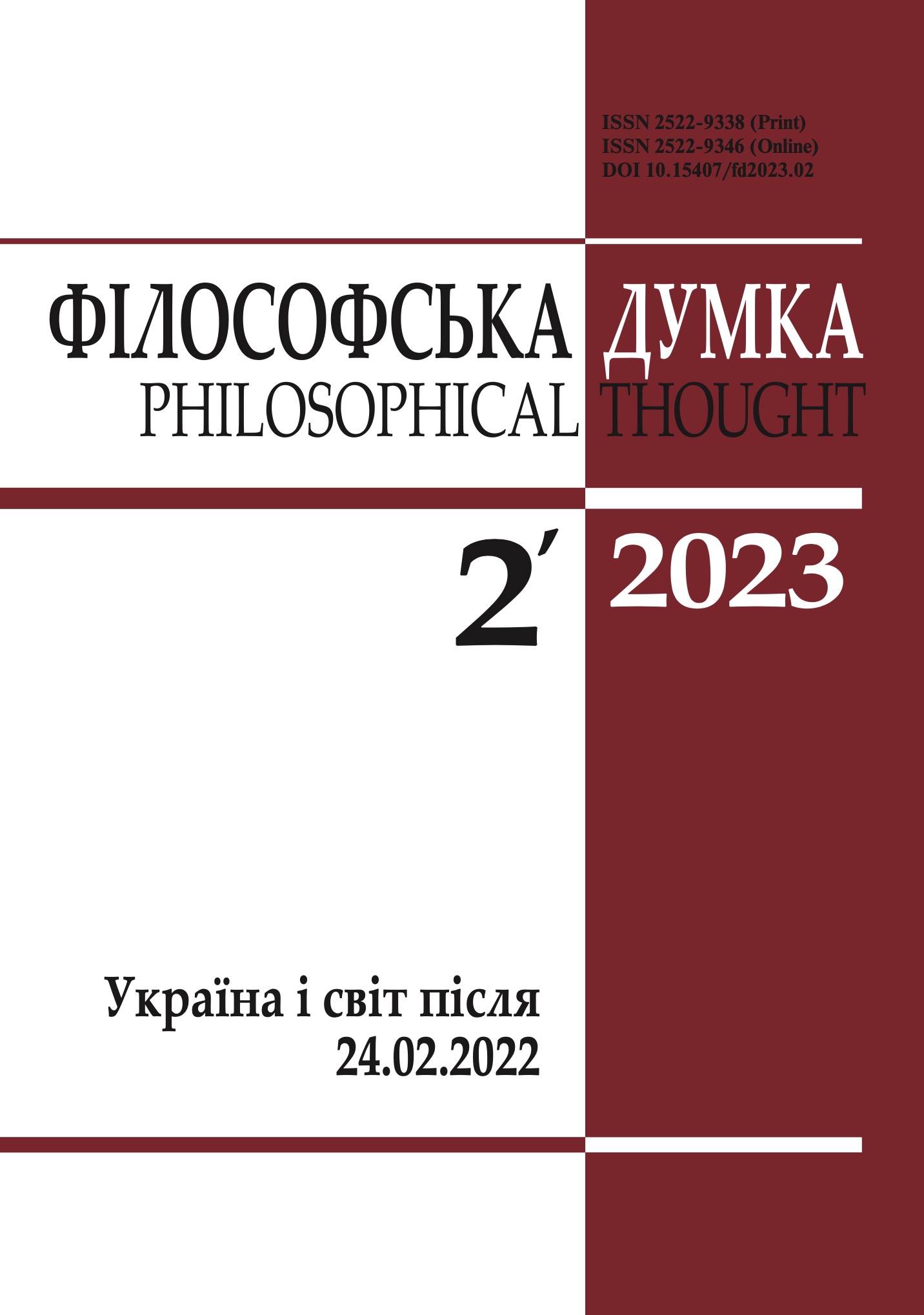THE MODERN INTERPRETATION OF HAPPINESS AND ITS APPLICABILITY TO UKRAINE
MODERN HUMANITIES
DOI:
https://doi.org/10.15407/fd2023.02.172Keywords:
happiness, well-being, material and environmental factors of happiness, biophilia, post-war reconstruction of UkraineAbstract
The article is dedicated to the analysis of modern approaches to the definition, conceptualization, and interpretation of happiness to outline the conditions of a happy life for Ukrainians (Ukrainian happiness). This is important for the development of a vision of a post-war future, the definition of the integral goal of post-war development, and the role of the policy of happiness in it.
The article considers subjective and objective, internal and external conditions of happiness, including the dependence of happiness on both economic and environmental conditions in their interconnectedness. The relevance of such an analysis is conditioned by the global situation (the global environmental crisis, growth of the environmental threats and challenges, diminishing of the total natural capital, etc.) and the national reality (environmental damage as a result of Russian aggression and the challenges of post-war restoration).
Special attention is paid to the non-linear influence of material well-being and its effect on happiness, as well as the dependence of happiness on the quality of the environment. The analysis of this issue is based on the consideration of: 1) Easterlin paradox; 2) Layard’s “The Big Seven factors affecting happiness” (family relationships, financial situation, work, involvement in the community and friendship, physical and mental health, personal freedom and personal values); 3) the methodology of “conversion” of natural capital into a long, comfortable, and happy life for people (Happy Planet Index); 4) hypothesis of biophilia as the evolutionarily determined psycho-emotional connection of man with nature and as a precondition of well-being and happiness (E. Wilson, S. Kellert).
It is concluded that for Ukraine it is important not only to estimate the economic and environmental losses caused by Russian aggression but also the economic and environmental cost of post-war reconstruction. A strategy for harmonizing economic, social, and environmental policies as components of an integral policy of happiness should be worked out. Nature should be considered not only as a source of economic growth but also as a basis for satisfying non-material human needs and feelings of biophilia.
References
Besser, L. (2021). The Philosophy of Happiness. An Interdisciplinary Introduction. 1st ed. Routledge.
https://doi.org/10.4324/9780415249126-L033-2
Building a Sustainable and Desirable Economy-in-Society-in-Nature. Report to the United Nations for the 2012 Rio+20 Conference. (2013). ANU E Press.
Capaldi, C.A., Dopko, R.L., Zelenski, J.M. (2014). The relationship between nature connectedness and happiness: a meta-analysis. In: Frontiers in Psychology. Sec. Cognitive Science, 5, 1-15. https://doi.org/10.3389/fpsyg.2014.00976
https://doi.org/10.3389/fpsyg.2014.00976
Cortazar, J. (2009). Reader for Manuel: Novel. Transl. from Spanish by P. Taraschuk. [In Ukrainian]. Kharkiv: Folio.
Costanza, R. (2008). Ecological Economics: Creating a Sustainable and Desirable Future. Iowa State University.
Drach, I., Krymsʹkyi, S., Popovych, M. (1084). Hryhorii Skovoroda: Biographical novel. [In Ukrainian]. Kyiv: Molodʹ.
Easterlin, R.A. (1974). Does Economic Growth Improve the Human Lot? Some Empirical Evidence. In: Nations and Households in Economic Growth: Essays in Honor of Moses Abramovitz. Ed. by P.A. David, M.W. Reder (pp. 89-125). Academic Press. https://doi.org/10.1016/B978-0-12-205050-3.50008-7
https://doi.org/10.1016/B978-0-12-205050-3.50008-7
Efimenko, V. (2002). Happiness. [In Ukrainian]. In: Philosophical Encyclopedic Dictionary (p. 729). Kyiv: Abris.
Frankl, W. (2004). Man in Search of True Meaning. Transl. from English by O. Zamoyska. [In Ukrainian]. Kyiv: KSD.
Frey, B.S. (2011). Peace, war, and happiness: Bruder Klaus as wellbeing facilitator. International Journal of Wellbeing, 1 (2), 226-234. https://doi.org/10.5502/ijw.v1i2.5
https://doi.org/10.5502/ijw.v1i2.5
Gardashuk, T. (2022). Environmental Threats of War in Ukraine. Envigogica, 17 (1). https://doi.org/10.14712/18023061.639
https://doi.org/10.14712/18023061.639
Global Happiness and Wellbeing. Policy Report 2019. (2019). Global Council for Happiness and Wellbeing.
Goncharov, K. (2022). Ukrainians are among the top 10 unhappiest nations - sociologists. [In Ukrainian]. In: DW: Society, 3 February 2022. Retrieved from: https://www.dw.com/uk/ukraintsi-vkhodiat-do-top-10-naineshchasnishykh-natsii-sotsiolohy/a-60642782
Gullone, E. (2000). The Biophilia Hypothesis and Life in the 21st Century: Increasing Mental Health or Increasing Pathology? Journal of Happiness Studies, 1 (3), 293-322. https://doi.org/10.1023/A:1010043827986
https://doi.org/10.1023/A:1010043827986
In the World Happiness Ranking, Ukraine Ranks Fifth from the Bottom - Poll. (2021). [In Ukrainian]. In: LB. Ukraine. Retrieved from: https://lb.ua/society/2021/01/14/475196_svitovomu_reytingu_shchastya_ukraina.html
Keat, R. (2000). Market Boundaries and Human Goods. Royal Institute of Philosophy Supplements, 45, 23-36. https://doi.org/10.1017/S1358246100003283.
https://doi.org/10.1017/S1358246100003283
Kellert, S. (1997). The Value of Life. Biological Diversity and Human Society. Island Press.
Krymsʹkyi, S. (2010). About Wisdom, Truth, and the Senses of Human Existence. [In Ukrainian]. In: A Collection of Scientific Journalistic and Philosophical Articles. Kyiv.
Layard, R. (2005). Happiness: Lessons from a New Science. Penguin Books.
Luman, N. (2010). The Reality of Mass Media. Ed. by V. Ivanov, M. Minakov. [In Ukrainian]. Kyiv: TsVP. The (Un)Happy Planet Index. The Index of Human Well-Being and Environmental Impacts. (1986). NEF; FoE.
The (Un)Happy Planet Index 2.0. Why good lives don't have to cost the Earth. (2007). NEF.
Veenhoven, R., Diener, E., Michalos, A. (2000). What this journal is about. Journal of Happiness Studies, 1 (1), 5-8. https://doi.org/10.1023/a:1010077309452
https://doi.org/10.1023/A:1010077309452
Wilson, E.O. (1995). Naturalist. Warner Books. Island Press.
World Database of Happiness. Archive of Research Findings on Subjective Enjoyment of Life. Retrieved from: https://worlddatabaseofhappiness.eur.nl/search-the-database/bibliography/
Yaroschuk, O. (2017). (Un)happy nation. Are Ukrainians really the unhappiest in Europe? [In Ukrainian]. In: Vox Ukraine. Retrieved from: https://voxukraine.org/ne-shhasliva-natsiya-chi-spravdi-ukrayintsi-najneshhasnishi-u-yevropi
Downloads
-
PDF (Українська)
Downloads: 166
Published
How to Cite
Issue
Section
License
Authors who publish with this journal agree to the following terms:
- Authors retain copyright and grant the journal right of first publication.
- Authors are able to enter into separate, additional contractual arrangements for the non-exclusive distribution of the journal's published version of the work (e.g., post it to an institutional repository or publish it in a book), with an acknowledgement of its initial publication in this journal.
- Authors are permitted and encouraged to post their work online (e.g., in institutional repositories or on their website) prior to and during the submission process, as it can lead to productive exchanges, as well as earlier and greater citation of published work (See The Effect of Open Access).


